Tips & Tricks | Estimated Read time – 10:05
Building a strong online presence is crucial for event organizers.
More participants than ever are turning to search engines like Google to look for their next endurance event and more events than ever are jockeying to be the first one they see.
How can you give your endurance event the best chance to appear high in search results? The answer is search engine optimization.
Search engine optimization, or SEO, is the process of creating, modifying, and promoting online content, including websites and web pages, to improve your ranking in search engine results pages (SERPs).
An effective SEO strategy for event organizers can help increase the likelihood of ranking higher in search results and being found by more potential participants.
SEO goals for event organizers can range from ensuring your website or registration page shows up in searches for your event name, to appearing in general, wide-reaching searches for running events in your town, city, state, or beyond.
Implementing an effective SEO strategy is a marathon, not a sprint. It takes time to establish the authority your event’s website needs to improve how it ranks in search engines.
However, there are a few simple steps you can take right now to begin improving search engine optimization for your event. We’ve put together 5 tips you can use to help boost your event’s rankings.
Three Pillars of SEO That Event Organizers Need to Know:
- Technical SEO — Ensuring your website’s structure is search engine and mobile friendly
- Content SEO — Publishing pages that correspond with the search queries you want to rank for.
- External SEO — Getting more links to your website to build search engine ranking authority
1. Name your event with SEO in mind
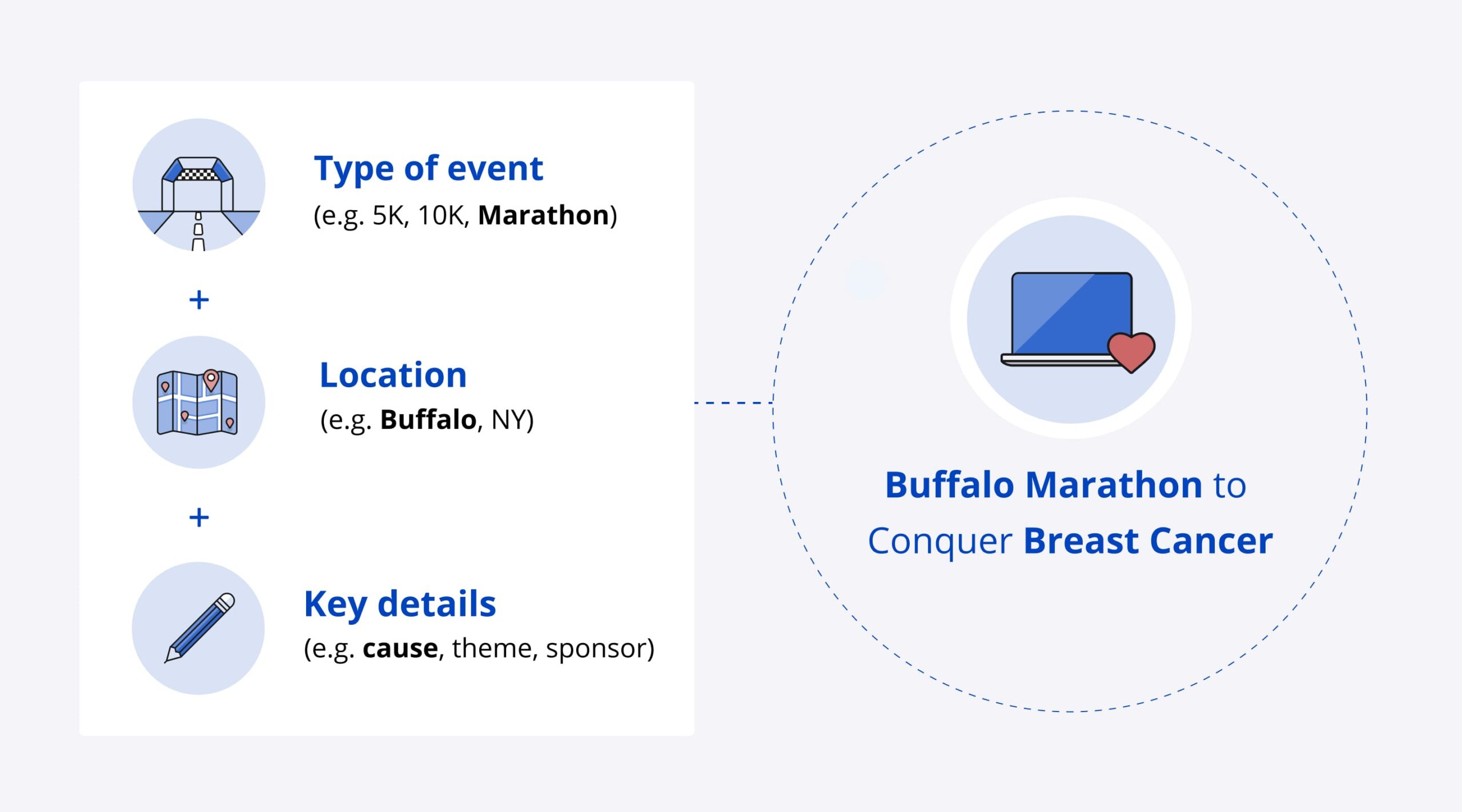
As an event organizer, your number one SEO goal is to ensure your website and web pages rank high for searches of your event’s name. When your potential participants search for your event, your website should be among the first results they see.
The best place for you to start is to create a unique and memorable event name that includes the type of event (5K, 10K, marathon, etc.) and your event’s location. If your event includes multiple distances, include only your banner event in your event name.
Start with your event type and its location—and be specific. If you create an event name that’s too generic, you may find your race floating in a vast sea of search results where users have to scroll through three pages of results just to find yours.
For example, if you’re organizing a 5K endurance event in Buffalo, New York, you should include “Buffalo” and “5K” in your event name. You can even add “New York” to increase your chances of better search results.
However, “The Buffalo, New York 5K” is still generic enough that you risk getting lost on a page with every other 5K event in Buffalo. This is where being unique and memorable pays off.
What sets your event apart from other events? Is your event for charity or does it have a theme? Does your event have a main sponsor? Describe those key details in your event name.
The “McDonald’s Buffalo 5K to Conquer Breast Cancer” has a much better chance of ranking in the top results when searched for by potential participants than “The Buffalo, New York 5K” does.
The other benefit of creating a unique and specific event name is that you’re more likely to appear in general search queries like “5K in Buffalo.” This gives you the opportunity to catch the eye of a wider audience of potential participants who may not necessarily know about your event yet.
2. Optimize your website for SEO
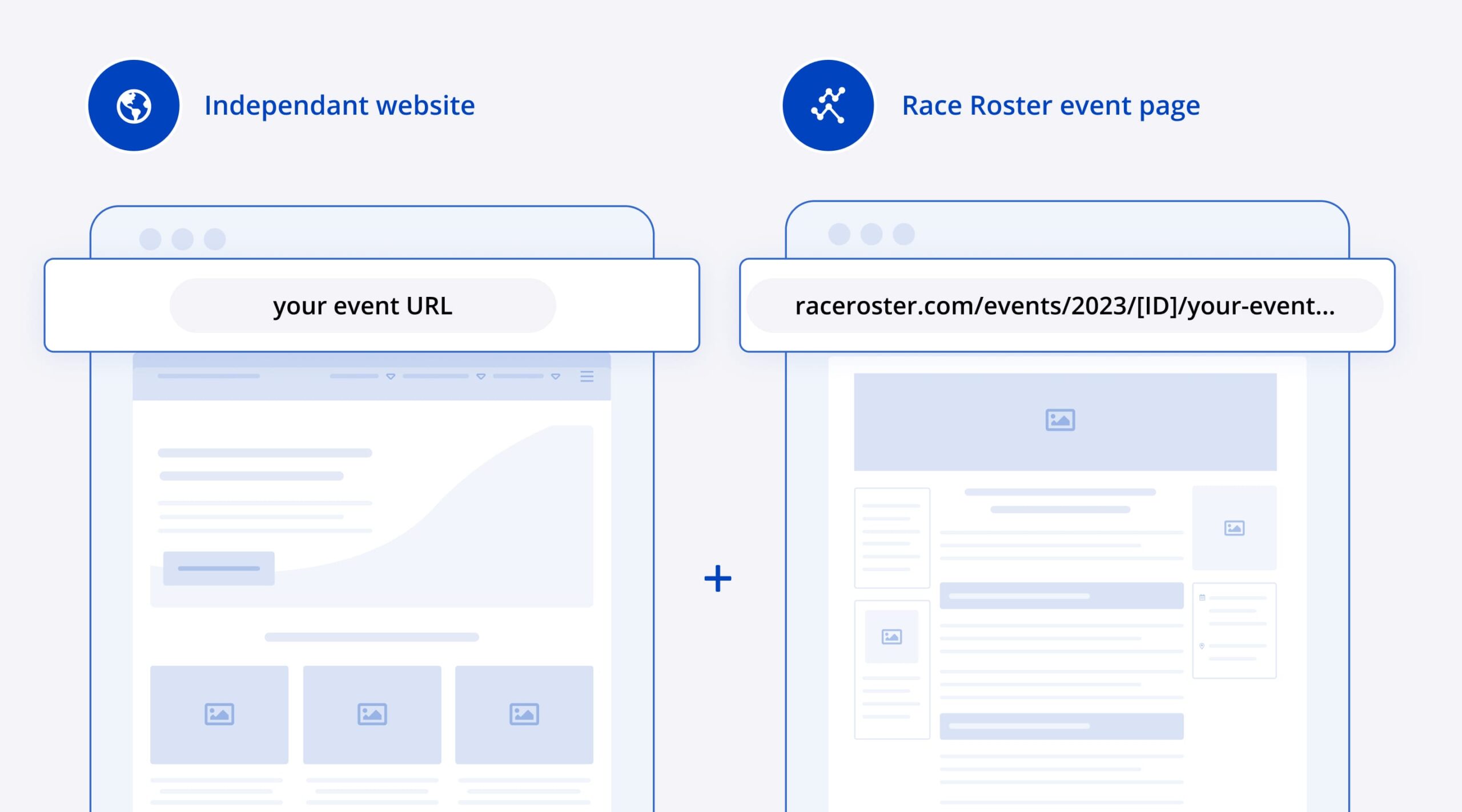
Optimizing your event’s website for search engines like Google is known as “on-page SEO.” By making adjustments to your website and its content, you can increase your event’s chances of appearing in relevant searches more often.
We recommend that you maintain and update an independent website for your event year-round, and use a registration platform like Race Roster for year-to-year event sign-up pages. By doing this, you help your event’s main website build search engine authority while making your year-to-year registration pages easier to find.
Did you know?
Race Roster offers the ability to redirect your previous year’s registration page to your new page. This allows you to leverage your previous year’s search rankings to direct participants to your new page.
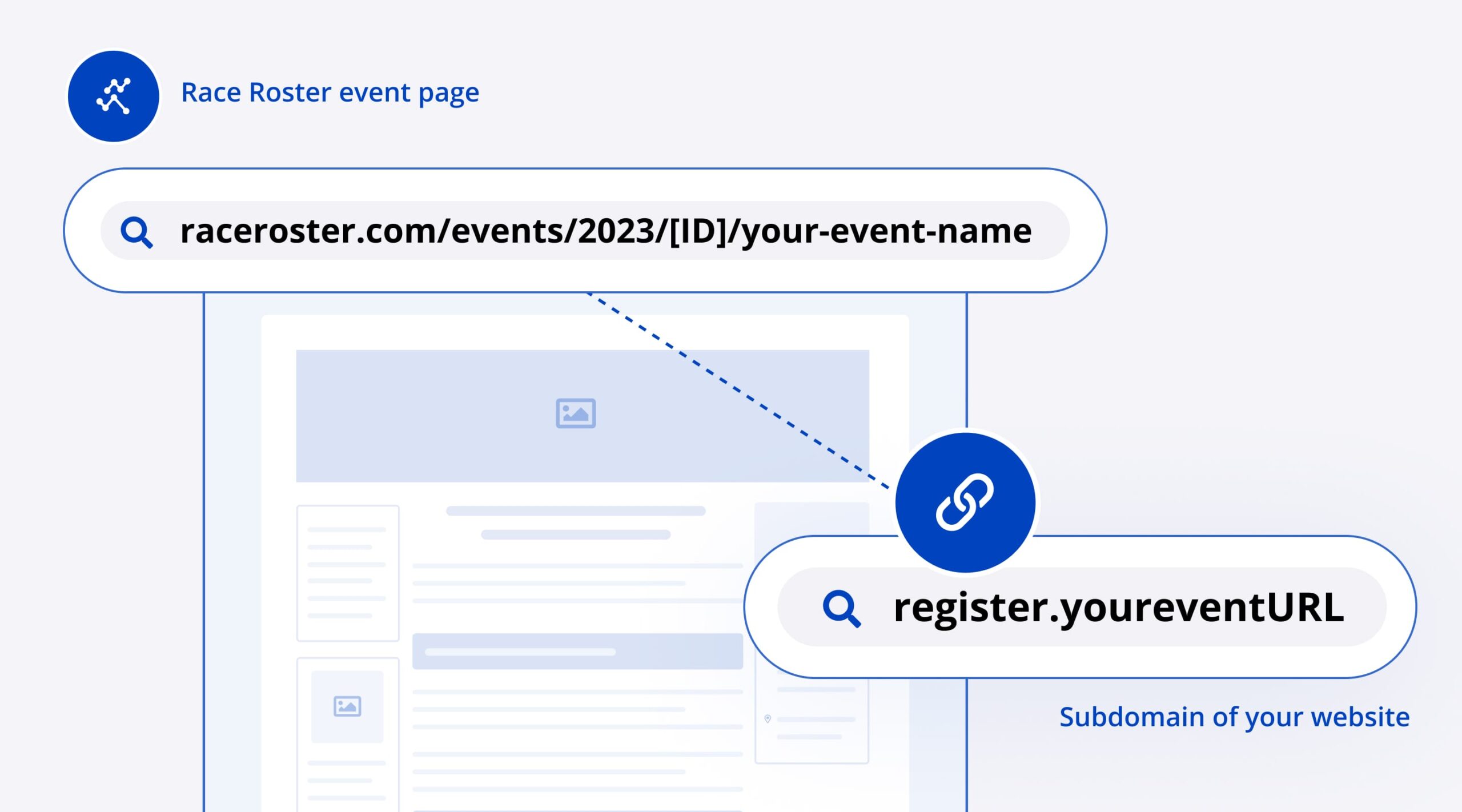
You can also create a custom domain for your registration page through Race Roster that can be a subdomain of your website (or used as your main website if you don’t already have one). A registration page with a custom domain helps you ensure links to that page are also links to your main domain.
What are some other steps you can take to help optimize your event website? We’ve broken down three important ones:
- Use search-friendly keywords
Think of keywords as descriptive language people will use to find your event on the internet. Throughout your website, consistently include your event type, location, date, time, and other important details people are likely to search for. - Update your website year-round
Search engines prefer websites that are updated regularly. Maintain your website consistently by updating it for your next event, posting fresh content, and linking to your registration page, as well as your social media channels. - Avoid one-page websites
An event website that includes separate pages for event information (home page), registration, packet pickup, race day details, and frequently asked questions is more likely to rank on search engines because the information is easier to access.
3. Prioritize off-page SEO and link building
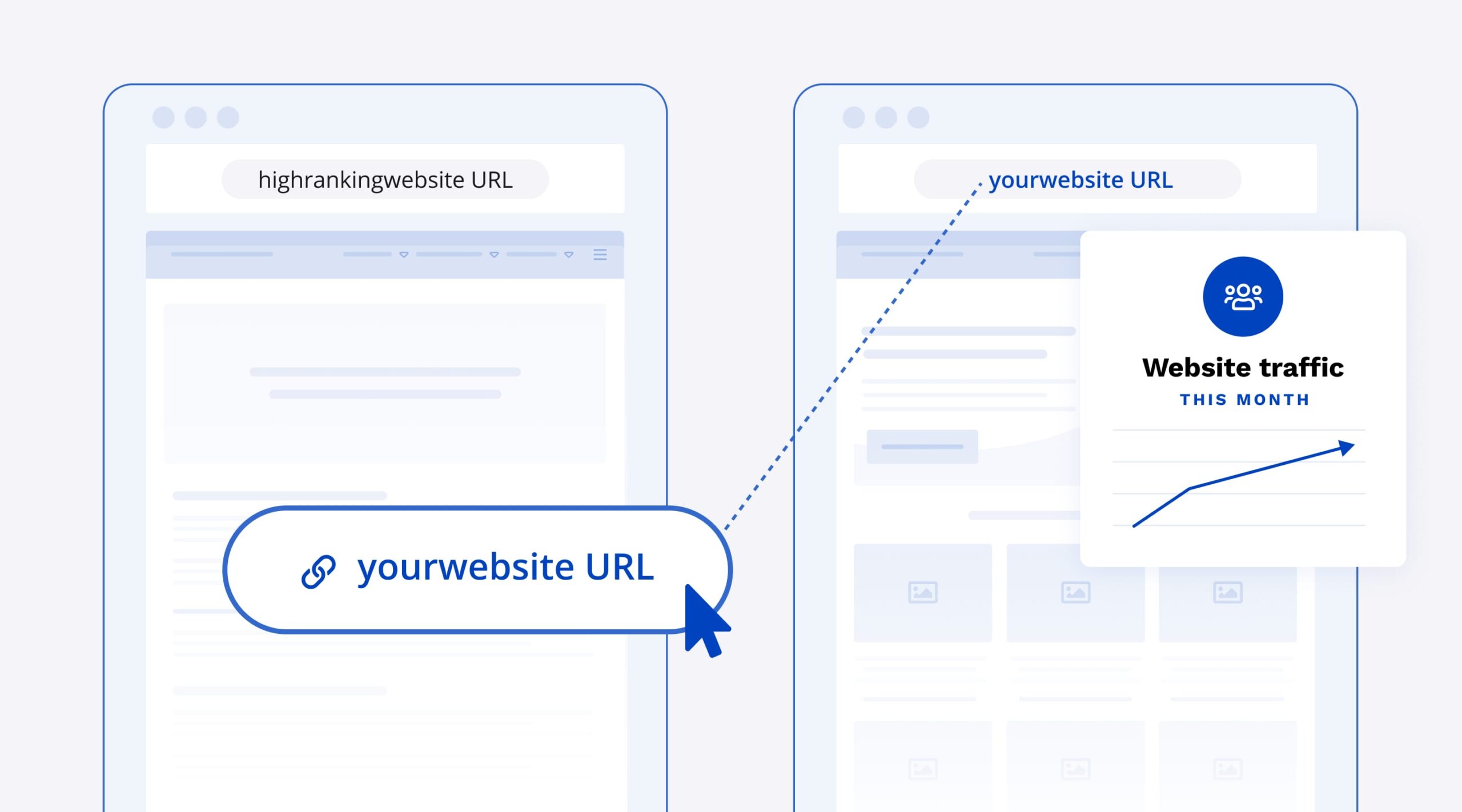
Off-page SEO can be just as important as on-page SEO in achieving a higher ranking on search engines.
What is off-page SEO? Off-page SEO is what you do away from your website or online content to build search engine authority and boost your rankings.
The best way to improve your off-page SEO is by getting other websites to link to your website in their content. Links are like votes for your website to rank higher in search results.
The more links to your website from other trusted websites, the more search engine authority it establishes for you and your event, and the higher your event ranks for relevant search queries.
However, not all links are created equal. A link from a topically related, high-ranking source like runnersworld.com, for example, can have a powerful impact on SEO while a link from a relatively unknown blog could have little-to-no influence on your rankings.
How can you get more links to your event website? We have a few ideas.
- Get Your Event Listed — Have you noticed that major event listing websites are among the top results when you search “running race near me”? See if you can get your event listed on as many of those event listing pages as possible. This will build search engine authority, and get your event seen by more people.
- Use Your Connections — You’ve built great relationships as an event organizer. Use those connections to boost your online presence. Reach out to your event’s sponsors, partners or suppliers and ask if they would be willing to link to you in their content.
- Make News — Coverage of your event is a great opportunity to get links. Contact local news or bloggers and tell them why they should be covering your event. Or if someone mentions your event but doesn’t link your website, reach out and ask them to add the link.
- Create Quality Content — Quality content can do wonders for your event’s search rankings. When you consistently publish great content to your website, like helpful how-to articles, it gives other websites more reasons to link back to you.
4. Add event structured data to your website
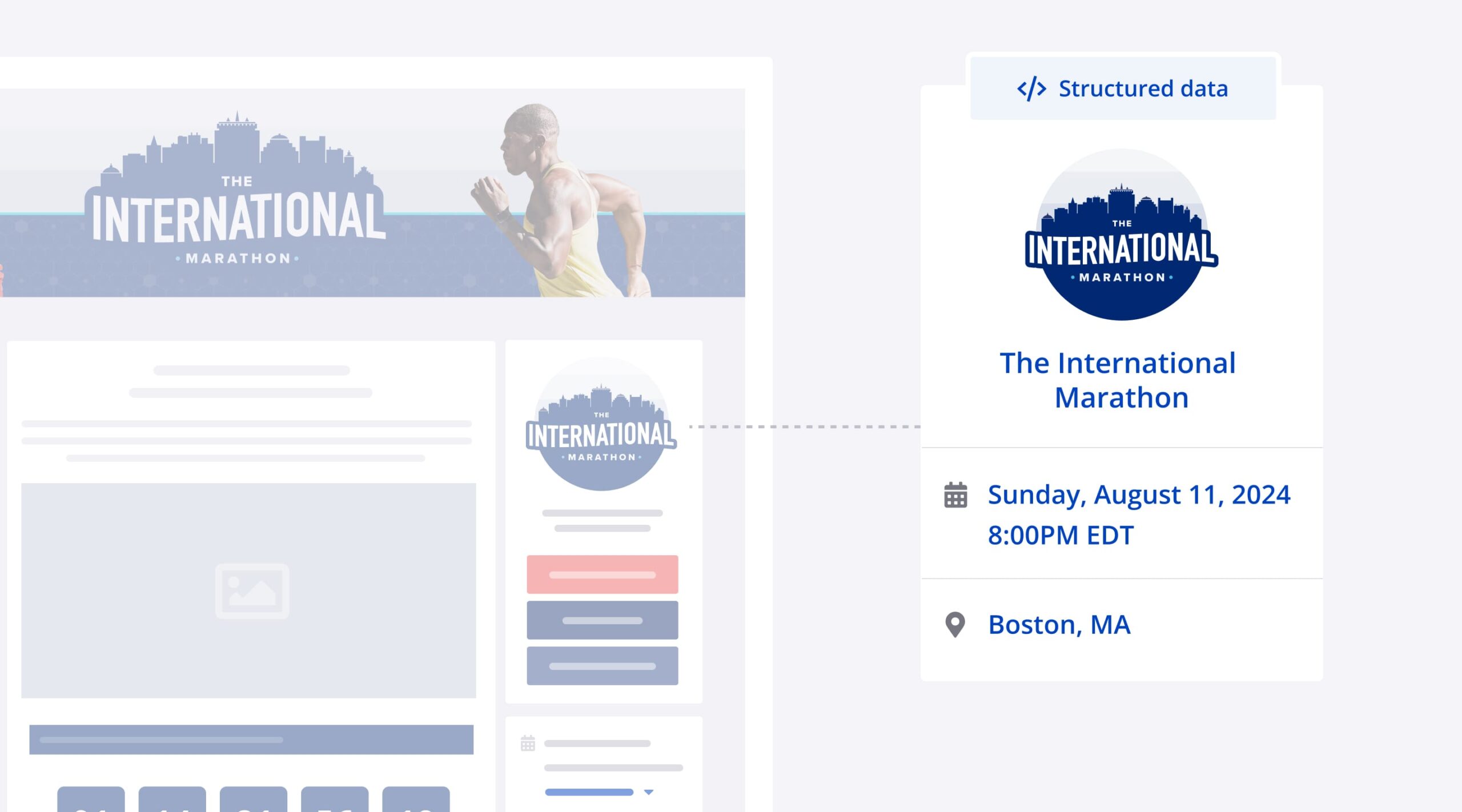
Structured data, also known as event schema markup, is the code that search engines use to understand content on web pages. Adding structured data to your event’s registration page will give search engines specific details about your event that it can use to display in search results.
With structured data, search engines can show special information about your event in search results that will set your content apart from regular web pages. This includes essential information like your event’s name, location, and start time, as well as extras like an event logo or interactive map.
Here’s an example of how your event can appear in a Google search using structured data:
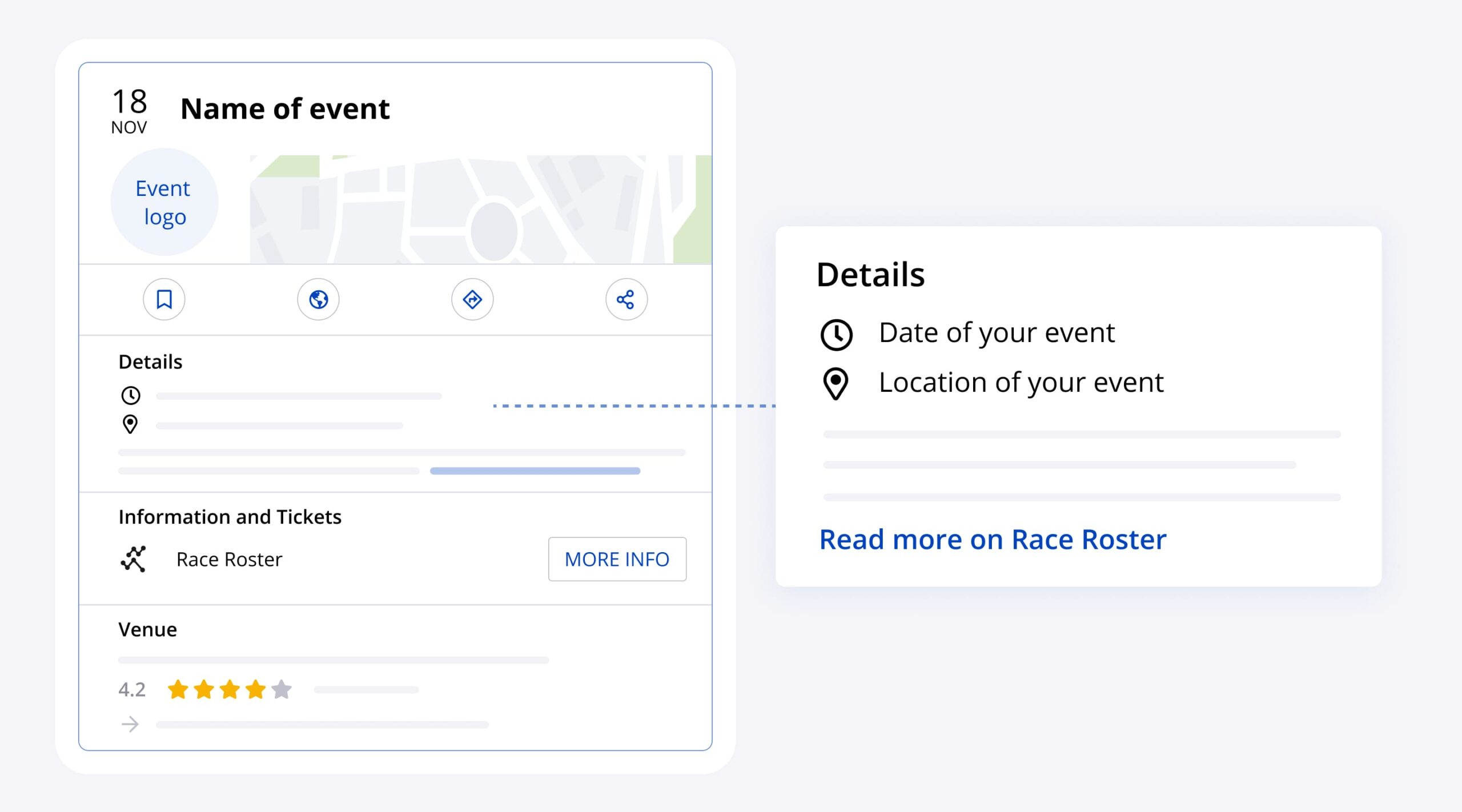
You can implement structured data on your event website or registration page through custom development or using a plugin, depending on the content management system you use to manage your website.
Adding structured data to your web pages can be intimidating if you don’t have any experience in web development. That’s where Race Roster can help.
When you complete an event listing page using the Race Roster platform, the details you provide—like date, time, and location—are also included as structured data within your event listing page on Race Roster.
Here’s how an event that uses the Race Roster platform can appear in searches thanks to structured data:
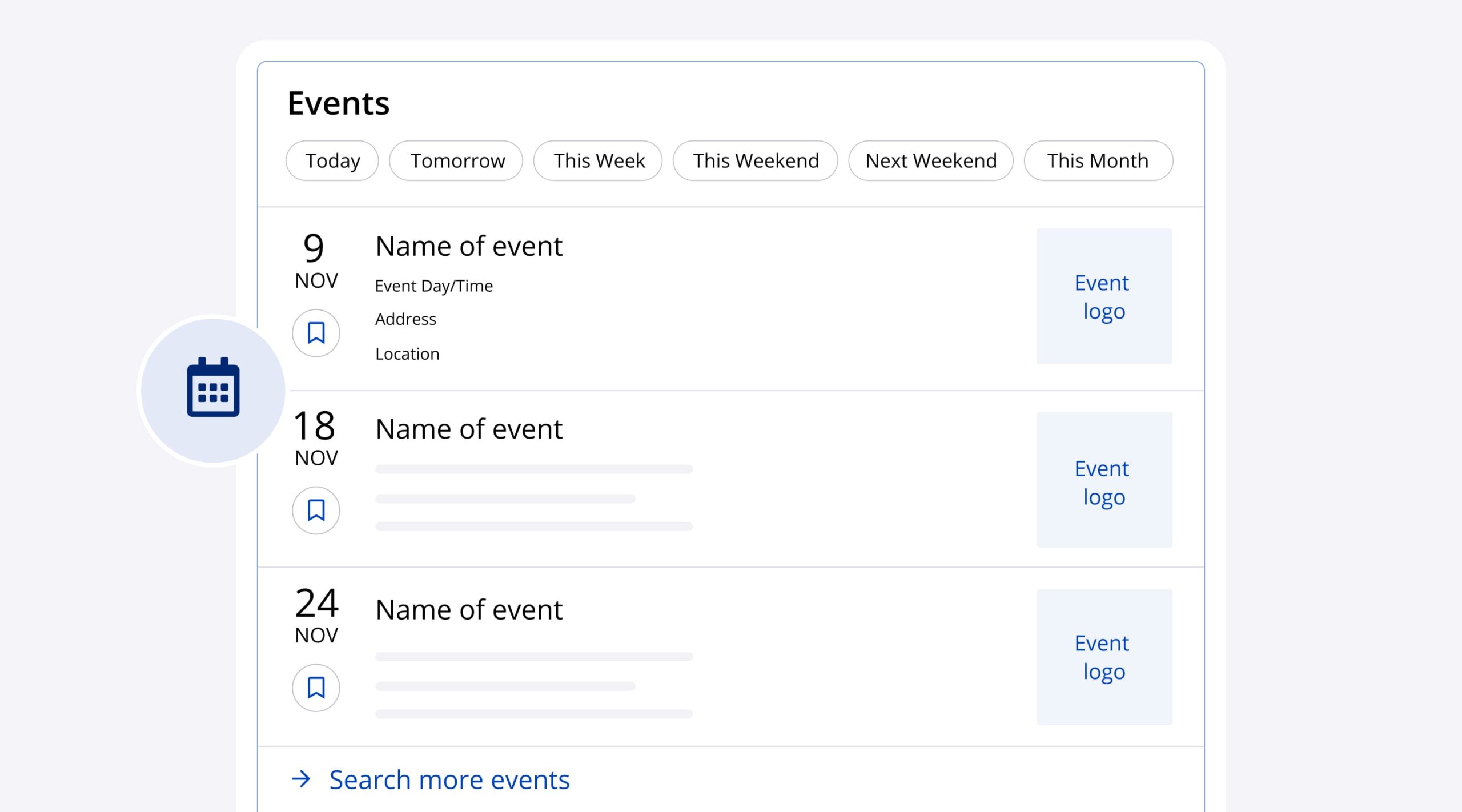
With the Race Roster platform, you can benefit from structured data so your event is easier to discover by potential participants in search results.
5. Consistently post and create fresh content
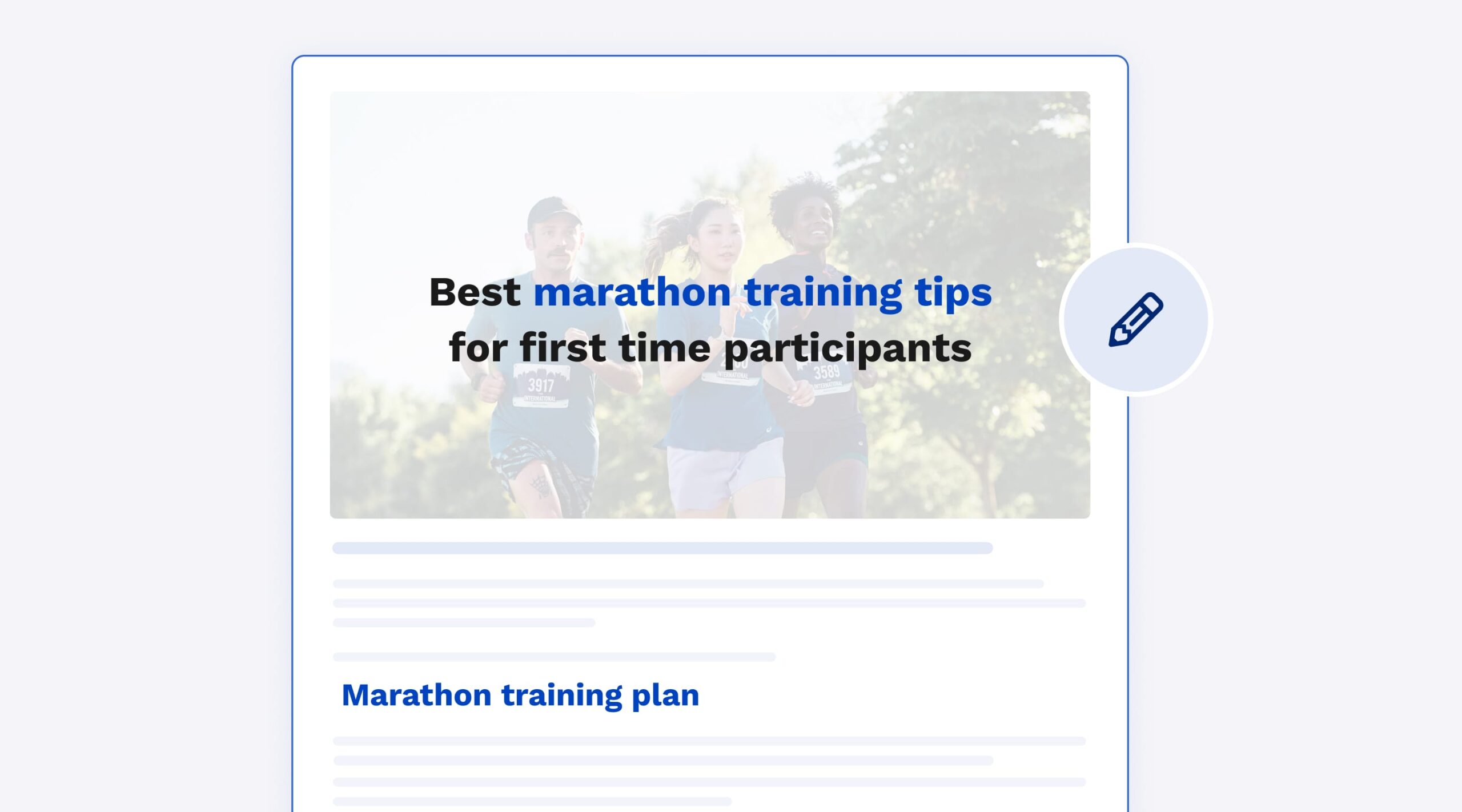
Content is king in the world of search engine optimization.
When you’re consistently posting quality content to your event’s website, you’re more likely to get backlinks from high-ranking websites, and more likely to show up in relevant search queries.
We understand that posting content regularly on your website, on top of all your other responsibilities, can be overwhelming. The good news is that creating quality SEO content can be easy.
The most important part of creating good SEO content is knowing your target audience, and no one knows your event’s audience better than you.
What do your participants care about? Think about the most common questions, problems and observations your event’s participants bring up and build content ideas around those. For example, an article on the best ways to prepare for race day or how to stay hydrated during an endurance event.
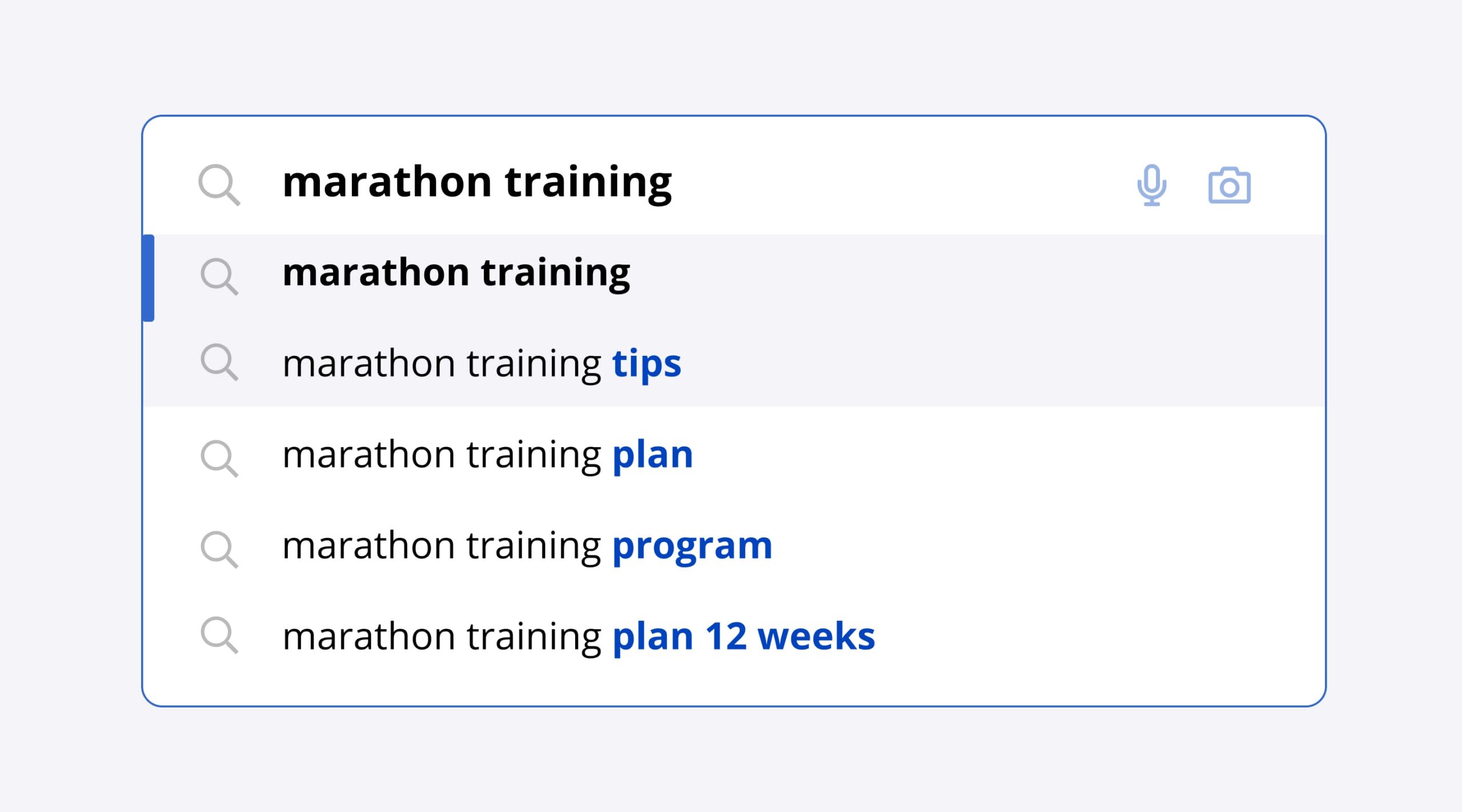
You can also do some basic keyword research to find out what topics your target audience is searching for. This can be as simple as using the autocomplete function in Google’s search bar to find ideas or Google’s free Keyword Planner to discover trending topic ideas. Other SEO tools such as Semrush, Ahrefs, or Moz offer limited free basic tiers you can try.
Whatever type of content you decide is most effective for your audience, do your best to post regularly, and promote your fresh content so you have a better chance of building backlinks.
Bonus tip: Harness the power of video
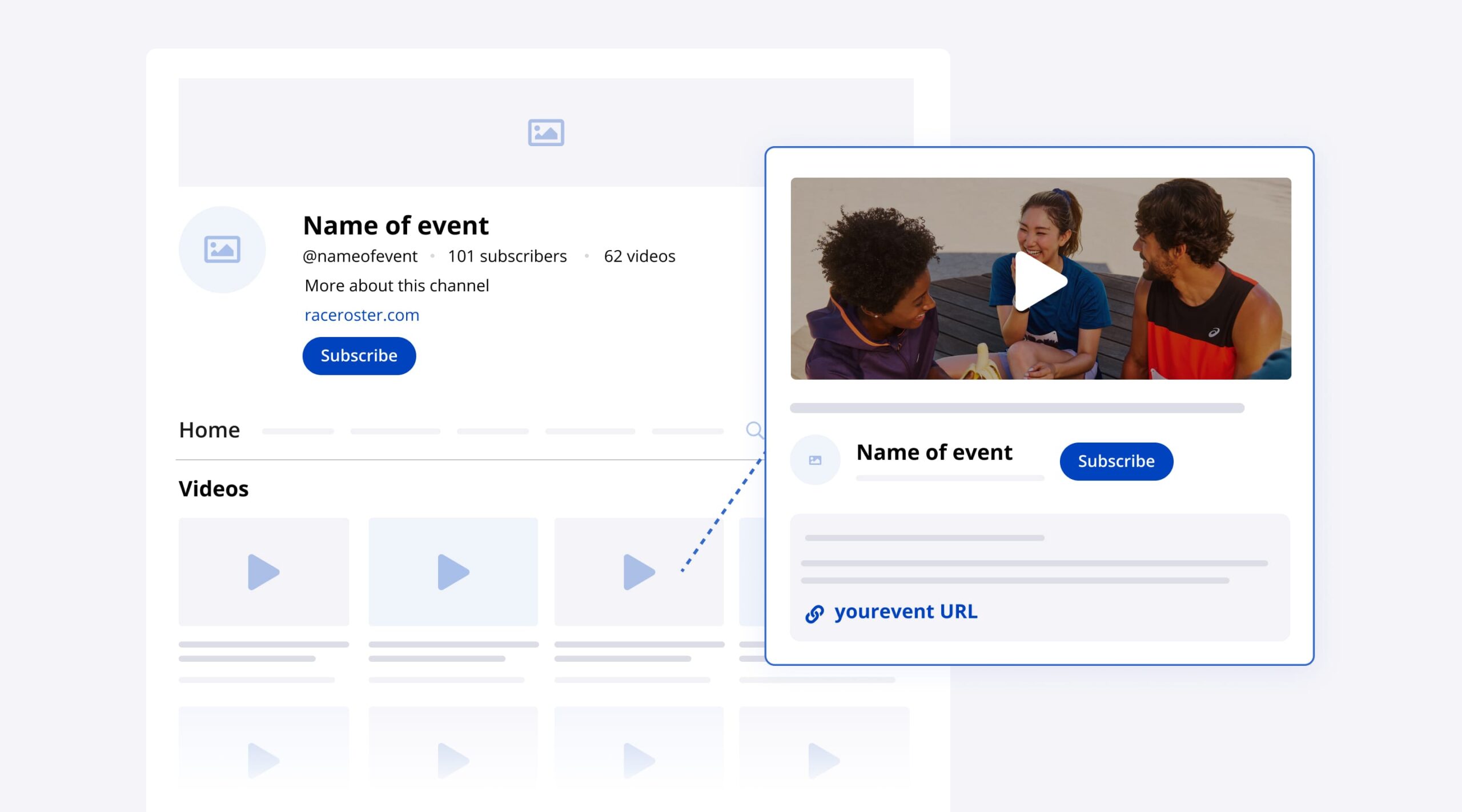
Chances are you’re already creating great video content around your event. Use all that amazing video to your advantage!
Search traffic on YouTube is growing rapidly as video becomes the most popular form of digital content. Posting your videos on YouTube is an opportunity to promote your event to a new audience, and create more opportunities to rank in search results.
Create a YouTube channel for your event (if you don’t have one already) and post the best videos from before, during, and after your event to the channel. Make sure you give each video a click-worthy name as well as a video preview and write a detailed video description that always includes links back to your website.
Conclusion
Implementing an effective SEO strategy can help you reach a larger audience and grow your event, but patience is key. Your event’s search engine results won’t change overnight and you’ll likely need to attempt multiple strategies to find measurable success.
Don’t let that discourage you. Follow our SEO tips to lay the foundation to a stronger search engine presence and stick to it even if you don’t see immediate results. Test different tactics, analyze how these tactics perform, and try new things as you learn more about SEO.
Over time, you will start to see the benefits that an effective SEO strategy can have on your event.

What’s new at Race Roster?
Visit our what’s new page for the most noteworthy Race Roster updates!